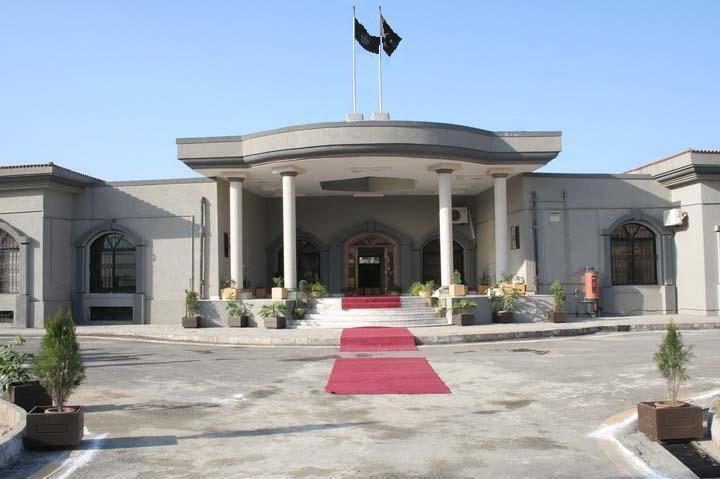ISLAMABAD:
The judges of the Islamabad High Court (IHC) have decided to challenge the rejection of their representation, sources have revealed. A petition against the decision is expected to be filed in the Supreme Court in the coming days.
According to sources, the representation seeks the restoration of the previous seniority structure of the IHC. Additionally, the petition will request the annulment of the decision issued by IHC Chief Justice Aamer Farooq, who had dismissed the representation.
Chief Justice Aamer Farooq had previously upheld the placement of three transferred judges to the IHC from three other high courts, affirming their rankings at the second, ninth and 12th positions in the seniority list.
The new seniority list was challenged by five IHC judges.
The chief justice ruled that the transferred judges did not require a fresh oath and that their seniority would be counted from the date of their first oath in the high court. Accordingly, the new seniority list of IHC judges will remain unchanged.
On Feb 1, the judges’ strength at the IHC increased with the transfer of Justice Sarfaraz Dogar from the Lahore High Court (LHC), Justice Khadim Hussain Soomro from the Sindh High Court and Justice Muhammad Asif from the Balochistan High Court.
Later, on Feb 4, a revised seniority list was issued, designating Justice Sarfaraz Dogar as the senior puisne judge, followed by Justice Mohsin Akhtar Kayani as the second senior-most judge and Justice Miangul Hassan Aurangzeb in the third position.
Justice Tariq Jahangiri was in the fourth place, Justice Babar Sattar fifth, Justice Sardar Ishaq Khan sixth, Justice Arbab Muhammad Tahir seventh, Justice Suman Riffat Imtiaz eighth, Justice Soomro ninth, Justice Azam Khan 10th, Justice Muhammad Asif 11th and Justice Inam Amin Minhas 12th.
Following the new seniority list, Justice Kayani, Justice Jahangiri, Justice Sattar, Justice Khan and Justice Imtiaz submitted a representation to the chief justice, saying that Justice Dogar could not be considered an IHC judge until he took oath as required under Article 194 of the Constitution.
The five judges said Justice Dogar had only been sworn in as a LHC judge. However, the IHC’s seniority list already listed him as an IHC judge, placing him directly below the chief justice. They urged the chief justice to resolve the matter before the JCP meeting.
Sources said the IHC chief justice rejected the representation and instructed the IHC registrar’s office to inform all those five judges about his decision on the representation. Accordingly, Justice Dogar, who took oath as a high court judge in 2015, would be the senior puisne judge of the IHC.
Written order
The IHC chief justice on Wednesday issued a written order regarding rejection of representation of five judges against revised seniority list after the transfer of three new judges to IHC.
The chief justice ordered the registrar office to send its copies to the judges concerned.
The IHC’s justices including Mohsin Akhtar Kayani, Justice Tariq Mehmood Jahangiri, Justice Babar Sattar, Justice Sardar Ijaz Ishaq and Justice Saman Rafat Imtiaz have filed reservations against the new seniority list of the IHC.
The eight-page written order said, the bare perusal of the notification shows that Mr Justice Sardar Muhammad Sarfraz Dogar prior to the transfer was serving as a judge of Lahore High Court (LHC, Mr Justice Khadim Hussain Soomro was serving as judge of High Court of Sindh and Justice Muhammad Asif was serving as judge of Baluchistan High Court. In this regard the said judges took their oath as judges of the respective high courts.
It further said, “The said transfer of the above-mentioned judges has been made under Article 200 of the Constitution under which the president may transfer a judge of a high court from one high court to another but this can only be done with the consent of the judge concerned and after consultation with the chief justice of Pakistan and the chief justices of the both the high courts.”
It said, “Article 200 of the Constitution speaks of the transfer of a judge from one high court to another. The terms “appointment” and “transfer” cannot be given the same meaning and have to be treated differently.”
The decision said, “there was no requirement for the judges transferred to this court to take fresh oath and the same is evident from the bare reading of the notification.”
The decision stated, “In India though the governing Article (Article 222 of the Indian Constitution) is quite different from ours, but the transfer of judges is frequent.”
“It is to be noted that once a judge has taken oath as a judge of the high court, he continues to be the judge until he attains the age of sixty-two years or is removed or resign or dies or is elevated as a judge of Supreme Court of Pakistan. Thus, when a judge is transferred, he does not vacate the status and office as a judge of the high court but only to the extent of the office which he had been holding as a judge of the particular high court from which he is transferred.”
The written order said, “The fact that the oath prescribed in the third schedule refers to a particular high court does not mean that at the time of transfer fresh oath of transferee high court is mandated. The judge under transfer continues to be a judge and has the same status and office which he enjoyed prior to transfer.”
It said, unlike India, we do not have a transfer policy but since the Constitution is the specifically provides so, the President of Pakistan can affect the transfer within the mandate of the constitution. No doubt that there is a concept of inter se seniority within the high court but there is also a concept of seniority amongst the judges in different high courts which a judge once appointed shall carry.”
The order read, “In light of the referred fact that after the transfer of judges the inter se seniority in this court changed the revised seniority list was issued based on the constitutional provisions of Articles 194, 196 & 20 of the constitution. The revised seniority list is appended herewith.”
It said, “Due to the reasons mentioned-above the representation in hand is turned down and the seniority list as issued stands. The registrar office directed to forward the copies of the instant decision on representation to the concerned judges.”
Meanwhile, the district judiciary of Islamabad hosted a dinner in honour of Supreme Court nominees, including IHC chief justice and Justice Miangul Hassan Aurangzeb, and Justice Sardar Sarfraz Dogar, along with other judges who were transferred to the IHC from different high courts.
The event was attended by eight IHC judges while five judges who had sent the representation regarding the seniority issue were absent.
- Desk Reporthttps://foresightmags.com/author/admin/










